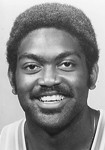The tournament was fun. There were spectacular plays and a couple of great games and one strange development.
The Southeastern Conference is still trying to stay in step. It encourages audience participation. It invites member schools to designate basketball “legends” to appear for one more round of recognition and applause from fans.
This has been going on for 20 years. Some really famous names have been remembered and honored. The Tennessee list is awesome: Bernard King, Ernie Grunfeld, A.W. Davis, Ron Widby, Dale Ellis, Reggie Johnson, Jimmy England, Bill Justus, Allan Houston, Tony White – you get the idea.
Shaquille O’Neal and Charles Barkley were awarded honorary comebacks. Pete Maravich was praised. Dan Issel reappeared. The good idea has raised many great players from the past to the present.
For this year’s tournament, Vanderbilt University sent forth Godfrey Dillard.
Do what?
Dillard, 70, is a distinguished attorney, a former State Department agent of some kind in Africa, an orator on the subject of civil rights. He may even be a major donor to Vanderbilt, or under solicitation.
What he is not is a basketball legend. His claim to fame? He was Perry Wallace’s roommate. As freshmen, they endured Starkville together.
Wallace was the smooth black youth, homegrown in Nashville, who was signed to integrate Vanderbilt athletics. He was a terrific choice for a tough job. He was valedictorian at Pearl High. He was a prep All-American.
Dillard says Dillard was opposite in several ways, also talented but a flamethrower from Detroit who had not exactly embraced the idea that 1966 blacks were to be seen when necessary but not heard.
Dillard says Dillard could play. He says he was third in freshman scoring. He calculated that he would be the sixth man on the varsity as a sophomore, maybe a starter. A knee injury in pre-season practice took him out. When he said he was again ready to go, doctors, trainers, coaches or somebody higher said no. He sat around on the B team and made waves on campus.
“Waves” is code for raising hell.
“I started a black newspaper at Vanderbilt. I was the first president of the Afro-American student government. I pushed for more black teachers, more black classrooms, more black studies, more black administrators.”
Dillard says, when he arrived, there were only eight black folks on the entire campus.
“And I was the only one from the north. I didn’t understand that athletes weren’t supposed to be politically active. When I came back for my junior year, they kicked me off the team.”
Dillard transferred and graduated from Eastern Michigan. He earned a law degree at the University of Michigan. He decided to add a master’s in international affairs from George Washington University. He has all-star credentials.
I like what I know about his career. He has appeared before the Supreme Court. He is one heck of a story. He is not a basketball legend. He never scored a point that counted. Vanderbilt knows that. It has some other agenda.
James Howard Wood was Tennessee’s legend in St. Louis. He is one.
Howard was a powerful but not-tall-enough center, 6-7 and 235 after trimming down, big hands, good hands. Mostly in the Don DeVoe era, he scored 1,201 points and claimed 595 rebounds from 1978 to 1981. He was twice all-SEC and second-team all-America, sponsored by Converse.
In an NCAA game against Virginia Commonwealth, Wood held the opposing center scoreless. In an NCAA game against Virginia, 7-4 Ralph Sampson outscored Wood, 9-8.
Howard was very serious about eating. Coach DeVoe says Howard showed up each September 25 or 30 pounds overweight. Trainer Mike Rollo was charged with major reconditioning. That Wood was always ready to go in December was a borderline miracle. Twice he was MVP of Christmas tournaments. There are other precious memories.
Former teammate Steve Ray remembers an overtime win at Alabama.
“Gary Carter throws a full-length bullet to Woody in the corner. He catches it, turns, double pumps, nothing but net at the buzzer.”
Vols chanted “Wood is good, Wood is good.”
Former teammate Ralph Parton will not forget Howard’s shot from the baseline that beat No. 2 Kentucky, Jan. 2, 1980.
“Woody had 14 of our 49. Kevin Nash had 12. We won without Reggie Johnson and Chuck Threeths.”
So, you heard that DeVoe said Howard was fat. You should have heard the tales Wood told on the coach at a high school banquet in Sweetwater. The exit was near. Howard was fearless.
Wood played one season in the NBA and 14 in “other” professional basketball – Billings Volcanoes, Wisconsin Flyers, but mostly in Spain. He made more than a living, made it back to his hometown, East Hampton, New York, and became a teacher and coach.
Now you know about a real basketball legend.
Marvin West invites reader reactions. His address is marvinwest73@gmail.com.

